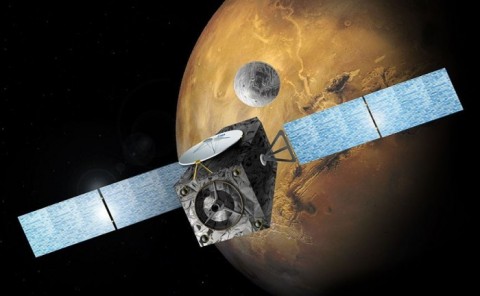CANNES, France & TORINO, Italy & PARIS & NEW YORK--(BUSINESS WIRE)--AdaCore today announced that its GNAT Pro Ada cross compilation environment has been successfully used by Thales Alenia Space to develop and verify the critical software embedded on the ExoMars program. Thales Alenia Space implemented in Ada two ExoMars On-Board Software (OBSW) components: one for the Trace Gas Orbiter (TGO) on an ERC32 target, and one for the Entry, Descent and Landing Demonstrator Module (EDM) on a LEON2 target.
Both TGO and EDM OBSW are hosted on their respective centralized hardware platforms. Each OBSW component is a self-contained piece of software handling all Platform applications and performing Payload interface management functions, which are necessary to fulfill the mission objectives under the satellite-specific operational conditions. The OBSW has been developed following a layered and modular architecture to facilitate an incremental development and verification process, to improve the management of multiteam development, to maximize reuse and to ease maintenance.
Thales Alenia Space also uses Ada for its internal real-time kernel product used to ensure a higher safety-critical level with a small memory footprint and good performance.
The development process has been performed according to the European Space Agency (ESA) ECSS standards, reaching compliance with criticality level B.
In addition to the compilation tools, several AdaCore tools were successfully used, including the GNAT Programming Studio (GPS) Integrated Development Environment (IDE) and the static analysis tool GNATstack.
The ExoMars program marks a continuation of GNAT Pro and Ada’s long and successful history in space applications, helping software developers to achieve the high reliability required in that domain.
“We are very pleased to have helped Thales Alenia Space go to the Red Planet thanks to our high-integrity tools for the Green Language,” said Cyrille Comar, AdaCore President. “Long-term space projects such as ExoMars gain particular benefits -- higher assurance with lower development and verification cost -- from our open-source tools and libraries that have been adapted to meet the most stringent certification requirements.”
“AdaCore has a longstanding business relationship with Thales Alenia Space,” said Laurent Scarfo, Thales Alenia Space OBSW project manager. “We started working together in 2007 with OBSW embedded in a satellites constellation. Now, AdaCore is flying successfully to Mars!”
About ExoMars
The ExoMars program is a cooperative effort between the European Space Agency (ESA) and the Russian Federal Space Agency (Roscosmos), with a contribution from NASA in the U.S.. Thales Alenia Space is leading the program as Industrial Prime for the European Space Agency.
ExoMars consists of two missions, one that was launched in March 2016 and a follow-up that is scheduled for 2020. In the ExoMars 2016 mission, an Orbiter (TGO) is carrying a Descent Module (EDM) that will land on the Martian surface in October. A platform deposited by the EDM will perform a variety of scientific measurements, while the TGO will measure the concentration of gas in the atmosphere once it reaches its final scientific orbit around Mars in December 2017.
About Ada
Ada was the product of an international competition to design a modern programming language for long-lived, high-integrity, embedded real-time systems, combining support for sound software engineering (for both sequential and concurrent applications) with facilities for low-level programming. The winning entry in the competition was known as the Green Language, from CII-Honeywell-Bull in France. Since its inception in the early 1980s, Ada has evolved to include full support for Object-Oriented Programming, a comprehensive set of predefined libraries, and various Specialized Needs Annexes for application areas such as Systems Programming. The most recent version of the language, Ada 2012, includes features for contract-based programming that embed low-level requirements in the source code where they can be verified either dynamically with run-time checks or at compile time with appropriate tool support. Ada usage continues to grow, especially in high-integrity domains such as space, avionics, air traffic management/control, rail systems, automotive, financial systems and many others.
About AdaCore
Founded in 1994, AdaCore supplies software development and verification tools for mission-critical, safety-critical and security-critical systems. Four flagship products highlight the company’s offerings:
- The GNAT Pro development environment for Ada, a complete toolset for designing, implementing, and managing applications that demand high reliability and maintainability,
- The CodePeer advanced static analysis tool, an automatic Ada code reviewer and validator that can detect and eliminate errors both during development and retrospectively on existing software,
- The SPARK Pro verification environment, a toolset based on formal methods and oriented toward high-assurance systems, and
- The QGen model-based development tool, a qualifiable and customizable code generator and verifier for Simulink® and Stateflow® models, intended for safety-critical control systems.
Over the years customers have used AdaCore products to field and maintain a wide range of critical applications in domains such as space systems, commercial avionics, military systems, air traffic management/control, railway systems, medical devices and financial services. AdaCore has an extensive and growing worldwide customer base; see www.adacore.com/customers/ for further information.
AdaCore products are open source and come with expert online support provided by the developers themselves. The company has North American headquarters in New York and European headquarters in Paris. www.adacore.com
About Thales Alenia Space
Thales Alenia Space, a joint venture between Thales (67 percent) and Leonardo-Finmeccanica (33 percent), is a key European player in space telecommunications, navigation, Earth observation, exploration and orbital infrastructures. Thales Alenia Space and Telespazio form the two parent companies’ “Space Alliance”, which offers a complete range of services and solutions. Because of its unrivaled expertise in dual (civil/military) missions, constellations, flexible payloads, altimetry, meteorology and high-resolution optical and radar instruments, Thales Alenia Space is the natural partner to countries that want to expand their space program. The company posted consolidated revenues in excess of 2.1 billion euros in 2015, and has 7,500 employees in 8 countries. www.thalesaleniaspace.com




